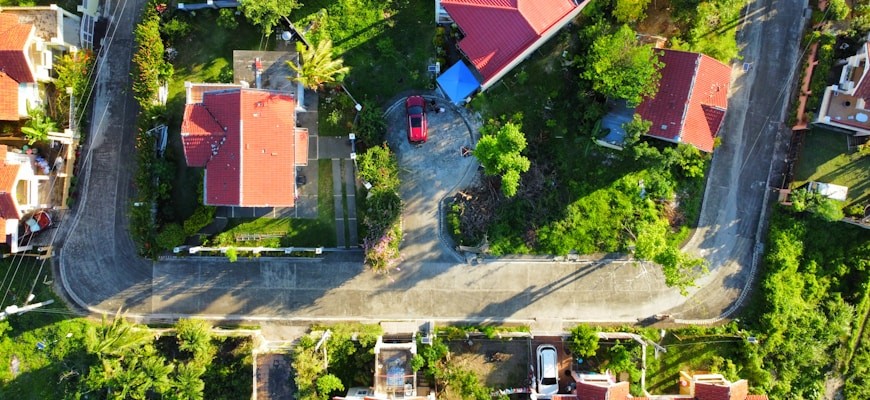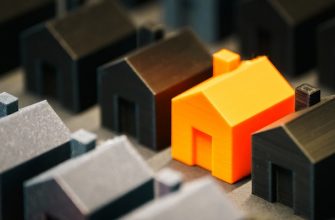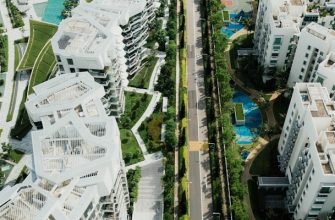- Harnessing Blockchain for Sustainable Building Practices
- Eco-Conscious Property Development: The Role of Distributed Ledger Technology
- Green Investments: How Blockchain is Transforming Real Estate Sustainability
- Decentralized Solutions for Eco-Friendly Urban Development
- The Future of Property Development: Merging Green Strategies with Blockchain Innovation
- Reducing Carbon Footprints: Blockchain Applications in Eco-Friendly Construction
Harnessing Blockchain for Sustainable Building Practices
The integration of blockchain technology into sustainable building practices presents a transformative opportunity for the real estate industry. By utilizing blockchain, property developers can enhance transparency, streamline processes, and promote eco-friendly initiatives within their projects. This innovative approach not only addresses environmental concerns but also fosters trust among stakeholders.
- Enhanced Transparency: Blockchain’s decentralized ledger allows for real-time tracking of materials and resources used in construction, ensuring that sustainable practices are adhered to. This transparency helps in verifying the sustainability claims of building materials.
- Smart Contracts: Implementing smart contracts within blockchain systems automates compliance with environmental regulations. These contracts can enforce eco-friendly standards, reducing the likelihood of non-compliance and promoting responsible development.
- Supply Chain Optimization: Blockchain facilitates efficient management of the supply chain for construction materials. By providing a secure and immutable record, it becomes easier to source sustainable materials and reduce waste throughout the building process.
- Tokenization of Green Assets: The tokenization of eco-friendly building assets enables fractional ownership. This innovative strategy allows for more investors to participate in sustainable property development, increasing funding for green initiatives.
Moreover, the adoption of blockchain in property development encourages collaboration among various stakeholders. By creating a shared platform, architects, builders, and investors can work together more effectively. This collaborative environment is essential for driving sustainability in the construction industry, as it allows for the sharing of best practices and innovative eco-friendly solutions.
In conclusion, leveraging blockchain technology in building practices not only promotes sustainability but also enhances operational efficiency. As the demand for eco-friendly property development continues to rise, embracing blockchain will be crucial for developers aiming to lead in this progressive market. The future of real estate lies in the intersection of technology and sustainability, making blockchain an indispensable tool for eco-conscious builders.
Eco-Conscious Property Development: The Role of Distributed Ledger Technology
In recent years, the integration of distributed ledger technology (DLT) in property development has emerged as a transformative force, particularly in the realm of eco-conscious initiatives. The application of blockchain in real estate not only enhances transparency but also promotes sustainable practices that align with environmental goals.
One of the primary benefits of utilizing distributed ledger technology in eco-friendly property development is the ability to streamline processes. By automating transactions and using smart contracts, developers can significantly reduce waste and inefficiencies. This efficiency not only saves resources but also minimizes the carbon footprint associated with traditional property development methods.
- Transparency: DLT provides an immutable record of all transactions, ensuring that sustainability claims can be verified and trusted by stakeholders.
- Traceability: With blockchain, every material used in construction can be tracked, allowing for better sourcing of eco-friendly materials and reducing environmental impact.
- Community Engagement: Blockchain technology facilitates community-driven projects, enabling local stakeholders to have a voice in sustainable development initiatives.
Moreover, the decentralized nature of distributed ledger technology empowers smaller developers and startups to enter the market. This democratization of property development fosters innovation and encourages the adoption of green building technologies. As more developers embrace eco-friendly strategies, the entire industry moves towards a more sustainable future.
In conclusion, the role of distributed ledger technology in eco-conscious property development is pivotal. By enhancing transparency, ensuring traceability, and promoting community involvement, DLT contributes significantly to the advancement of sustainable practices in the real estate sector. This synergy between blockchain and eco-friendly strategies heralds a new era of responsible property development, paving the way for a greener tomorrow.
Green Investments: How Blockchain is Transforming Real Estate Sustainability
In recent years, the intersection of blockchain technology and real estate has led to a significant transformation in sustainable practices within property development. Green investments are at the forefront of this evolution, demonstrating how blockchain can enhance environmental responsibility in real estate transactions.
Blockchain offers unparalleled transparency and traceability, crucial for promoting eco-friendly initiatives in property development. By utilizing decentralized ledgers, stakeholders can easily track the sustainability credentials of buildings, ensuring compliance with green standards. This technology fosters trust among investors, developers, and consumers, encouraging more green investments in the real estate sector.
- Efficient Resource Management: Blockchain facilitates better management of resources, reducing waste through precise tracking of materials and energy consumption.
- Smart Contracts: These programmable contracts automate processes, ensuring that all parties adhere to sustainability commitments without the need for intermediaries.
- Tokenization of Green Assets: Real estate assets can be tokenized, allowing investors to buy stakes in eco-friendly properties, thereby democratizing access to green investments.
- Incentivizing Sustainable Practices: Blockchain can create incentive mechanisms for developers who prioritize sustainability, rewarding them for using environmentally friendly materials and technologies.
The combination of blockchain and green investments is reshaping how real estate operates, making it more sustainable and efficient. As eco-consciousness grows among investors and consumers alike, the demand for properties that adhere to sustainable practices will continue to rise. This trend not only benefits the environment but also enhances the value of properties that are developed with sustainability in mind.
In conclusion, the integration of blockchain technology in real estate is paving the way for a new era of green investments. By ensuring transparency, efficiency, and accountability, blockchain is transforming the landscape of property development, making it possible to align economic growth with environmental stewardship.
Decentralized Solutions for Eco-Friendly Urban Development
Decentralized solutions are revolutionizing the landscape of eco-friendly urban development. Utilizing blockchain technology, these innovative strategies foster transparency, efficiency, and sustainability in property development. As urban areas increasingly face environmental challenges, adopting decentralized approaches becomes crucial for creating greener cities.
One of the primary advantages of decentralized solutions is the empowerment of communities. By leveraging blockchain, local stakeholders can participate in decision-making processes, ensuring that urban development aligns with the needs and preferences of residents. This participatory model enhances trust among community members and encourages collaborative projects that prioritize sustainability.
- Enhanced Transparency: Blockchain technology provides an immutable ledger, ensuring all transactions and decisions in urban development are transparent and traceable.
- Resource Efficiency: Decentralized solutions optimize resource allocation, reducing waste and promoting the use of sustainable materials in property development.
- Smart Contracts: These automated agreements streamline processes and reduce delays, allowing for timely execution of eco-friendly initiatives.
- Tokenization: This allows for fractional ownership and investment in eco-friendly projects, making sustainable urban development accessible to more individuals.
Furthermore, decentralized solutions facilitate better data management. With real-time data collection and analysis, urban planners can make informed decisions that significantly impact sustainability efforts. By understanding patterns in energy consumption and waste management, cities can implement targeted strategies that promote ecological balance.
In conclusion, decentralized solutions are paving the way for innovative, eco-friendly urban development. By embracing blockchain technology, cities can enhance community engagement, improve transparency, and promote resource efficiency. These strategies not only address current environmental challenges but also lay the groundwork for a sustainable future in urban living.
The Future of Property Development: Merging Green Strategies with Blockchain Innovation
The integration of innovative eco-friendly strategies within blockchain-based property development is paving the way for a transformative future in real estate. This convergence not only enhances sustainability efforts but also increases transparency and efficiency in property transactions. By leveraging blockchain technology, developers can ensure a more responsible approach to building and managing properties, which aligns with global environmental goals.
As the demand for sustainable living solutions grows, property developers are increasingly adopting green strategies. These methods focus on minimizing environmental impact through energy-efficient designs, sustainable materials, and smart technology. When combined with blockchain innovation, these eco-friendly initiatives become more robust, providing clear advantages such as:
- Transparency: Blockchain facilitates transparent record-keeping, allowing stakeholders to track the sustainability measures implemented in property development.
- Traceability: Every material used in construction can be traced back to its source, ensuring that eco-friendly practices are upheld throughout the supply chain.
- Smart Contracts: These automated agreements ensure that sustainability criteria are met before funds are released, promoting accountability among developers.
- Community Engagement: Blockchain platforms can foster community involvement in property development, allowing residents to have a say in eco-friendly initiatives.
Moreover, the merging of green strategies with blockchain technology can lead to the creation of eco-centric communities. These communities will not only focus on energy-efficient living but also utilize renewable energy sources, thus reducing the carbon footprint. The adoption of smart grids and energy-sharing mechanisms enabled by blockchain can further enhance the sustainability of property developments.
In conclusion, the future of property development lies in the successful integration of innovative eco-friendly strategies with blockchain technology. This synergy not only promotes sustainable practices but also reshapes the real estate landscape, making it more transparent, efficient, and aligned with environmental objectives. The continued evolution of these practices will play a crucial role in shaping responsible and sustainable urban environments for generations to come.
Reducing Carbon Footprints: Blockchain Applications in Eco-Friendly Construction
Reducing carbon footprints is a critical aspect of eco-friendly construction, and blockchain technology presents innovative solutions to achieve this goal. By integrating blockchain applications into property development, developers can ensure greater transparency and efficiency in their projects, ultimately leading to reduced environmental impact.
- Supply Chain Transparency: Blockchain enables real-time tracking of materials from source to site, ensuring that sustainable materials are utilized. This transparency helps to minimize waste and reduces the carbon footprint associated with transportation.
- Smart Contracts: These digital agreements automatically execute when predefined conditions are met, facilitating efficient resource management. By optimizing resource allocation, smart contracts contribute to lowering emissions during construction.
- Energy Management: Blockchain can facilitate the implementation of decentralized energy systems. By tracking energy consumption and production, developers can optimize energy use, further decreasing the carbon footprint of eco-friendly buildings.
- Carbon Credits Tracking: Blockchain allows for the accurate tracking of carbon credits generated through sustainable practices in construction. This encourages developers to adopt greener strategies and provides a financial incentive for reducing emissions.
As the construction industry increasingly adopts blockchain technology, the potential for significant reductions in carbon footprints becomes evident. The combination of transparency, efficiency, and innovative strategies empowers eco-friendly property development, paving the way for a more sustainable future. By leveraging these blockchain applications, developers can play a pivotal role in mitigating climate change and promoting environmentally responsible construction practices.









